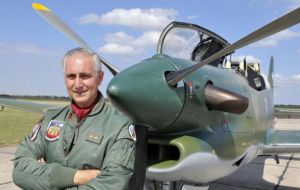MercoPress. South Atlantic News Agency
Argentine Air Force never recovered its Malvinas war operational capacity
 However the training of military pilots is fulfilled normally, said Brigadier Eduardo La Torre (Photo: La Voz del Interior)
However the training of military pilots is fulfilled normally, said Brigadier Eduardo La Torre (Photo: La Voz del Interior) Top Argentine Air Force officers admitted that since the Malvinas war the force never recovered its operational capacity, but in spite of the shortcomings and budget cuts the new generations of military pilots are completing their training and flying hours ‘normally’ even when the press reported to the contrary.
“Yes, I can say that we lost a hundred aircraft during and after the Malvinas war and we never recovered our operational capacity. The number is no strategic disclosure, and you must take into account that aircraft in combat are forced to their maximum and this has its consequences, it strains and severely limits the life span of equipment. Nevertheless and even when we have not recovered losses, we have managed to upkeep and even refurbish a few so our training capacity is fully accomplished”, said Brigadier Eduardo La Torre head of the Military Aviation School with seat in Cordoba.
In an interview with the Cordoba daily La Voz del Interior Brigadier La Torre said that the old training Mentor aircraft is undergoing a feasibility report but at the same time there is a plan to replace them with the Argentine designed and manufactured Pampa IA-73, as a consequence of the re-launching of the Argentine Aircraft Factory, Fadea in Cordoba.
The Brigadier insisted that with the existing equipment and operational aircraft the aviation school can train Argentine military pilots in any of the different options: helicopter pilot, fighter pilot or transport pilot. “All training aircraft are operational”
Finally referring to the fact that many military pilots are opting for the private sector, Brigadier La Torre said they represent ‘heavy losses’ for the force, and ‘economically significant’ for the country given the resources involved in their training.
“But it’s not an exodus, and there are different motives: some are vocational: suddenly the pilot feels frustrated because he can’t update as his peers of other countries; he doesn’t feel there are economic incentives and that generates a crisis in the consumer society. Some doubt but some remain; such is my case because the experience of the Malvinas war taught me ‘what we stand for’ and what our task is, so our commitment is unyielding. Ethically leaving the force I find it wrong, but I must also admit it is a world phenomenon”, concluded the Argentine Air Force Brigadier.
This year the Argentine Military Aviation School is celebrating its one hundredth anniversary and on May first the Argentine Air Force commemorates the thirty years since the ‘baptism of fire’ when it engaged in combat with the British Task Force.




Top Comments
Disclaimer & comment rules-

-

-

Read all commentsMaybe this will finally lay to rest the oh noes the argies are threatining to invade they cant. end of.
Apr 30th, 2012 - 09:02 am 0Seems a bit dangerous having you Air Force school and Aircraft factory in Cordoba, what would happen if the Spanish decide to Nationalise them?
Apr 30th, 2012 - 09:33 am 0The air force were the only Argentine military force to come out of the conflict with their credibility intact. They were the only units that stepped up to the plate and were considered brave and honourable by their British counterparts.
Apr 30th, 2012 - 11:14 am 0Commenting for this story is now closed.
If you have a Facebook account, become a fan and comment on our Facebook Page!